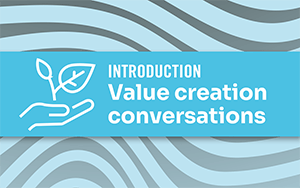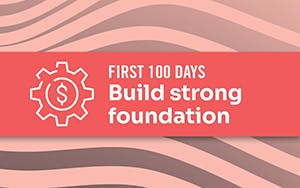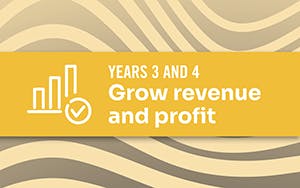
Multimedia | Stage 3 of the private equity transaction life cycle
Years 1 and 2: Streamline operations
Value Creation Conversations
In this video, Dave DuVarney, principal with Baker Tilly shares key points of the third stage of the transaction life cycle: Streamline operations.
Key topics discussed:
- The focus areas of Baker Tilly's digital team at this stage of the life cycle
- The digital investment strategies for companies of varying sizes
- The adoption of cutting-edge technologies
- The partnership approach with clients, including its process, duration, and level of involvement
- The diversity of digital adoption across industries and organization sizes
- The role of private equity firms in decision-making processes
Watch the video now for a deep dive into those critical years 1 and 2.
All Value Creation Conversations videos
Contact Baker Tilly's digital team
Dave DuVarney: Hi, I'm Dave DuVarney with Baker Tilly Digital and I focus on our data and analytics solutions.
Interviewer: Today we're going to talk about stage three in the private equity life cycle, years one and two, streamlining operations. What is the main focus of work that you're doing at this stage of the life cycle?
Dave DuVarney: Usually in years one or two when we're working with a private equity firm, we're trying to look at things that are either going to improve their efficiencies and/or cut costs. So a lot of the work in digital is around consolidating systems, potentially looking at how do they better leverage their data, but they're generally pretty tactical changes and how to make things just quick improvements for that organization.
Interviewer: How willing are your clients to make those types of investments? Are they pretty receptive or are they cherry picking service by service?
Dave DuVarney: It'll depend on how big the investment is. A lot of times when you talk about kind of larger core system changes, they might be nervous to do that, but if we can get down to a real clear value driver, a real clear ROI case, doing a smaller, more tactical project tends to work for them.
Interviewer: What is the main thing that you're bringing to the forefront?
Dave DuVarney: For a lot of it it's really adopting new technologies in a more agile fashion, so when we think about cloud, we think about the way that we can rapidly deploy technologies, again, we're going back to kind of these quick hit changes that are going to really make a value impact into the organization.
Interviewer: How involved do you get then, is the process overwhelming?
Dave DuVarney: I don't think the process is necessarily overwhelming. We try to partner with organizations, so depending on who they have on staff and what they want to do, as part of the delivery model, we'll move in and do that with them but it doesn't have to be an overwhelming process. It's definitely something we do with our clients and not to them.
Interviewer: How does this part of the process work differ within industries?
Dave DuVarney: I think within industries there's not a huge variation, so we always want to start with kind of what's that core value proposition that the organization is trying to achieve, and we're going to do that through an ideation session most times. What are your core issues? What's the evidence that they're happening? Then what's the value you get by solving them? Then we're going to move into those next early stages of developing prototypes and moving things along.
Interviewer: Do you work with larger companies or smaller companies or all over the board?
Dave DuVarney: It's all over the board. What we're doing with smaller organizations, we're definitely looking at what are those kind of quick value changes? What can we enable them to do themselves? But where with larger organizations, it's really the more transformative type changes. What are the biggest changes we can make within that organization based on their size?
Interviewer: What do you think is the overall feeling when Baker Tilly Digital shows up in the company?
Dave DuVarney: I think sometimes people feel like it's overwhelming. Sometimes they look at all the different technology trends that are out there, all the things that they could possibly do, and what we're trying to do is help them get down to what they should do. What's important, what's going to add value, what's going to be the right change for that organization at that time?
Interviewer: How long are you in there?
Dave DuVarney: It could be anywhere from a couple of months to we could be partnering for a year or longer depending on the type of transformation that we're moving through an organization.
Interviewer: Does that depend on the size of the company?
Dave DuVarney: It does, and we've had smaller organizations where we've been there... I have one where they're tiny, and we've been there for three years now, and I have one that's large and we've been there for four or five, so it just really depends on do we continue to add value, do they see value in the transformation we're making, and then we tend to kind of continue as long as they need our services.
Interviewer: When the decisions are being made on if you're moving forward and what process is it the portfolio company that's making the decision or the private equity firm?
Dave DuVarney: I think usually it's a portfolio company that's making the decision, but there's definitely an influence coming from the PE firm itself.
Interviewer: That makes sense. When you're working with these companies, is there a mainstream that you're seeing over and over again, or is each situation specific?
Dave DuVarney: I think when we talk about the portfolio company, we see two general themes emerge. One, from a PE perspective with portfolio companies, we see a lot of consolidation of core systems for them, so they're maybe bringing through transformation where they want to get the different portfolio companies onto the same system, we see that very often, and then we also see people leveraging data and analytics quite a bit. They know that the tools are out there, data's much more available, and they really want to drive some insights from their analytics.
Interviewer: What are some of the things that you wish that some of these portfolio companies would look at a little bit differently from a digital point of view?
Dave DuVarney: I think for me it's more the long term investment in some of these tools and technologies. A lot of times organizations, they look at an initial upfront cost, maybe they're afraid to change. When you look at a core system, you're really talking about the center of your business and all your business processes. If they would take that in a more serious vein to move it early, I think the long-term gains are there because now you're not precluded from scaling or moving forward because your technology is old and antiquated. Just move earlier, don't be afraid to make the change, and jump into those elements.
Interviewer: Thank you for watching. Count on Baker Tilly to guide you through each step of your transaction life cycle.

How digital transformation enables a culture of business innovation
Technology has increased customer expectations, catapulted productivity and unlocked the power of data analytics. Learn how a successful digital transformation journey and a winning customer experience go hand in hand to enable a culture of innovation.




